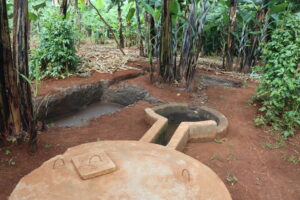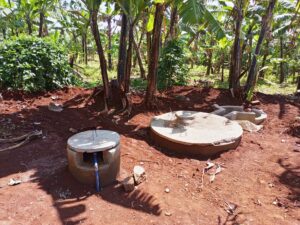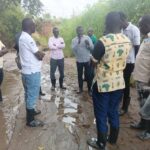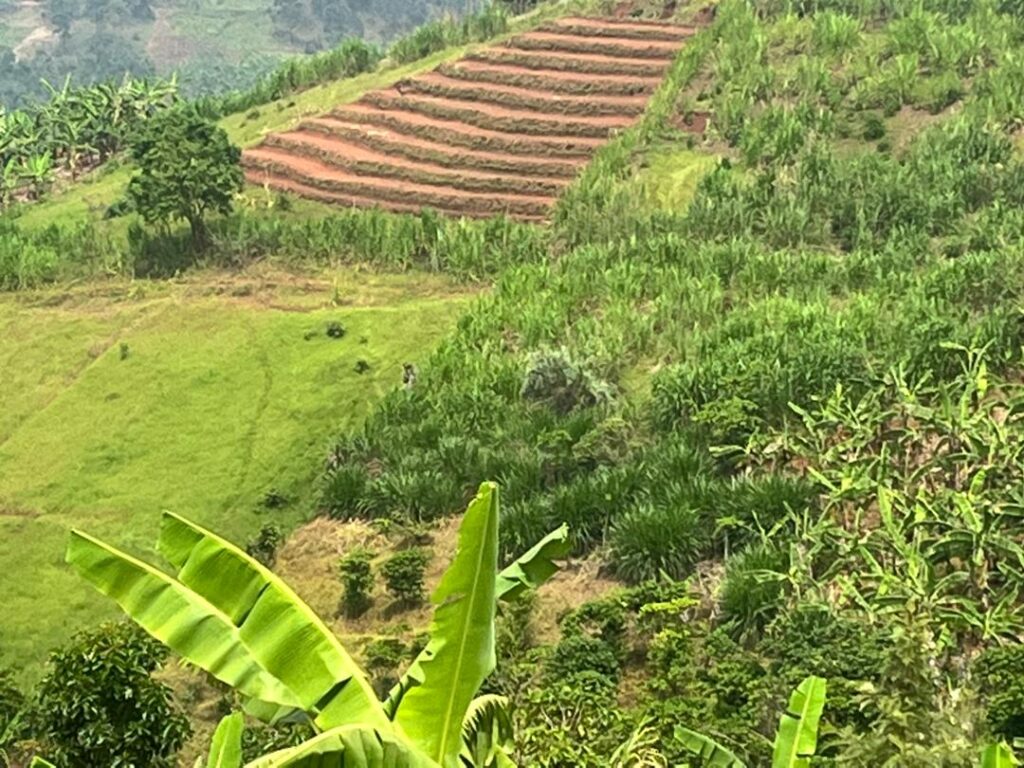Combating climate change with biogas digesters
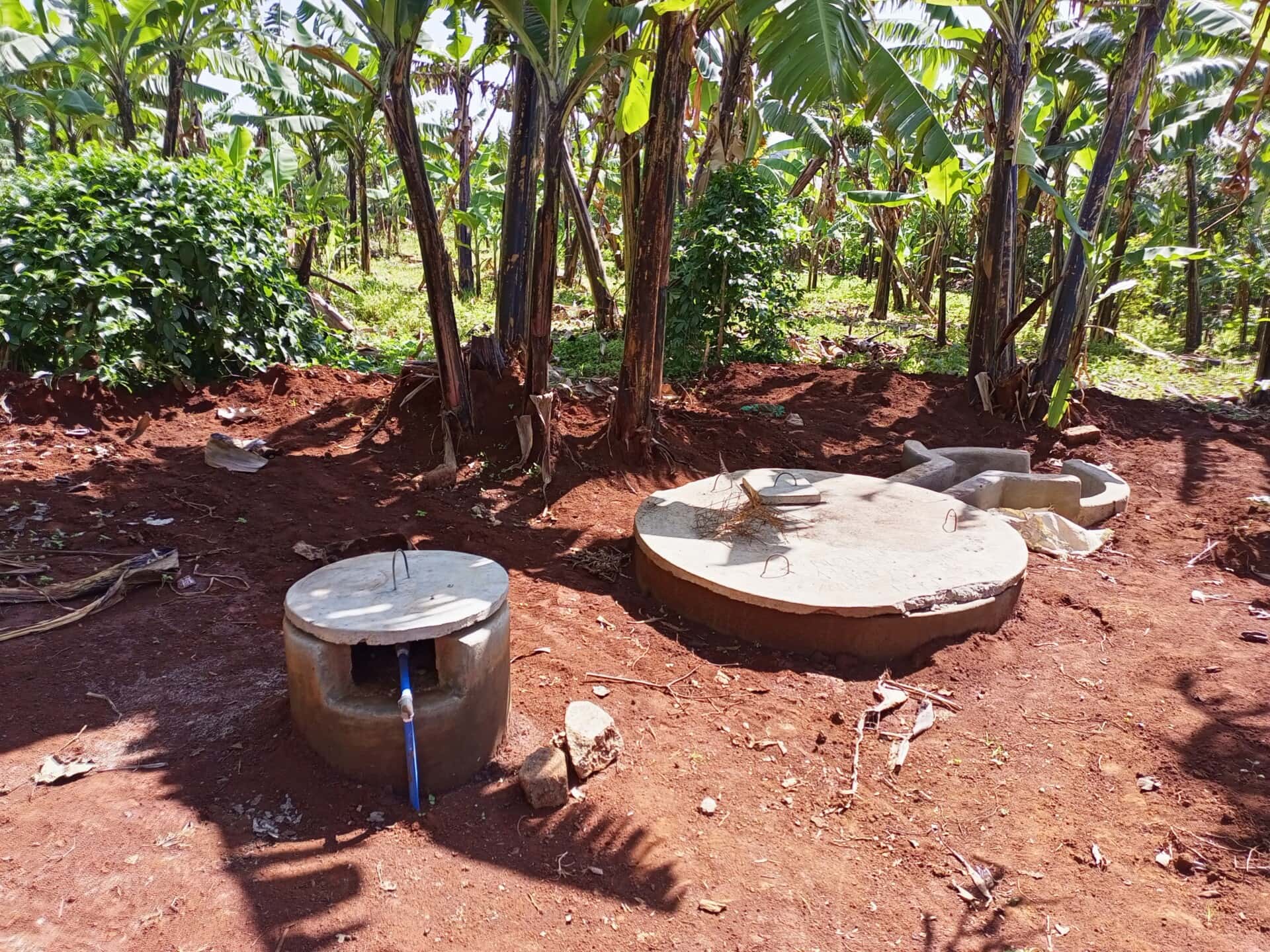
Article by Kikundwa Anne
People are “constantly cutting down trees,” says Mr. Kissa Charles, who is part of the Green Future Farming (GFF) Project in Kapchorwa District, Uganda. He also remarks that “they have nowhere else to get firewood.” As a demonstration farmer, Mr. Charles’ farm hosts technologies and best practices promoted by the GFF project. Initiatives under the GFF project tackle environmental challenges such as deforestation caused by the sourcing of firewood, which leads to drought and soil erosion in the Elgon region.
It is not hard to see the significant impact that the GFF project can make. Mr. Charles’ village overlooks a hill almost completely devoid of trees. His work on his farm shows how Mr. Charles has embraced the best practices introduced by AidEnvironment to conserve the environment. These include soil and water conservation practices, growing trees, harvesting rainwater and the installation of biodigesters.
It was seeing the consequences of environmental degradation firsthand that inspired him to act. He spoke of the good old days when agriculture was booming because of reliable rainfall, and when there were less cases of soil erosion.
“Before, we would have two seasons a year that would get a lot of rainfall. But because of [the] cutting down [of] trees, this has gradually changed. The seasons are unpredictable, and sometimes the dry season is prolonged,” says Mr. Charles.
The irregular seasons translate into either prolonged dry seasons or unpredictable heavy rainfall. Tree cutting leaves the soil loose and unable to retain water, leading to erosion and lower soil productivity. The use of a biodigester provides biogas as an alternative to this detrimental practice of cutting down trees for fuel. A biodigester is a system that utilizes organic waste, particularly animal waste, to produce biogas and bio-slurry as main byproducts. Biogas production comes from the breakdown of organic materials – food waste, manure, agricultural waste, etc. – in an anaerobic digestive process (meaning without the use of oxygen). The bio-slurry that is produced by this process is an excellent organic fertilizer that can be used to improve soils and crop yields.
With the use of biogas from the digester, there is no longer a need for firewood for cooking. Mr. Charles highlights that biogas technology reduces the need for firewood and improves soil fertilization, thus substantially reducing the threat of soil erosion. Biogas systems yield more, and better fertilizer because it is organic. The bio-slurry from the biogas digester is used as fertilizer in his banana, coffee, and other gardens. As a result, he has produced higher yields, and has more fodder for his domestic animals, which provide waste to feed his biogas digester. This contributes to a decreased danger of soil erosion on his farm that is attributable to overgrazing by his animals.
Mr. Charles is not the only one who benefits from the biogas digester. His wife also has a story to tell. Mrs. Yeko Agnes shares that biogas has saved her from the hard task of firewood collection: “I have more time for cooking, cleaning, and farming. I am happy because I am no longer exposed to smoke in the kitchen.” Indeed, the walls of her kitchen are no longer charred black with smoke and cooking for her family no longer takes a toll on her health. After getting a biogas system, she is keen on advocating for access to this technology by her group members. She belongs to a group of Mount Elgon organic farmers along with 25 other men and women.
“These biogas systems are really important because they slow the rate at which trees are used,” says Mr. Banana Joseph, the group Chairman. “In the long run, we’re trying to combat climate change. We believe everyone deserves access to information that’s grounded in science and truth, and analysis rooted in authority and integrity. That’s why we intend to keep partnering with AidEnvironment so that people can be better informed, united, and inspired to take meaningful actions to combat climate change like the installation of biogas digesters to reduce deforestation.”
Although biogas systems cost less than some other technologies, affording them is often still a challenge for low-income families in the Sebei region. Many of these families need financial and technical assistance to build them. AidEnvironment in Partnership with WASHFIN has stepped in to help in this regard. Community members will be provided loans to install the infrastructure, which they can pay back at an agreed period. Once more people have biogas systems in place, they can live healthier, more comfortable lives, while also reducing their impacts on the environment.

